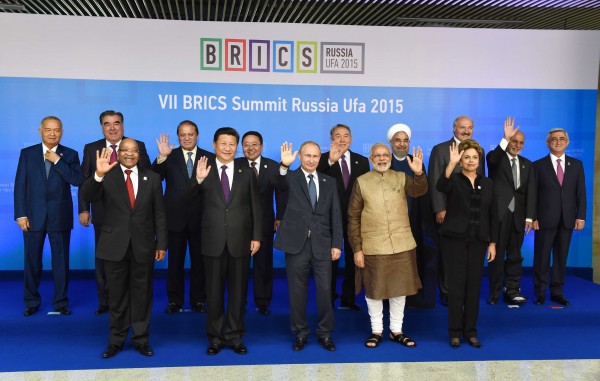BRICS: A New Way of Global Partnership
BRICS, 13 Jul 2015
Dr Alexander Yakovenko, LEAP/GEAB – TRANSCEND Media Service
4 Jul 2015 – BRICS is a product of the dynamic development of globalization and new centers of economic growth and political influence, aligning the interests of Brazil, Russia, India, China and South Africa.
The aim of this economic organization is to consolidate members’ positions in building a fairer and more balanced international order that reflects a polycentric nature of today’s international political, economic and cultural affairs.
Critics of BRICS prefer to underline the differences of the five member countries in economic, historical, cultural and civilizational terms that allegedly prevent them from building a sustainable 21st century binding alliance. I would like to disappoint them by saying that it is exactly the flexible and democratic nature of BRICS that provides a firm platform for cooperation between our countries. These are the differences that give BRICS credibility and help transform the organization into a fully-fledged mechanism for strategic cooperation of equals on key issues of world affairs.
The level of cooperation demonstrated in BRICS is a good example of how multilateral partnership should be built in the 21st century. No one dominates in our association; we work on the basis of genuine equality and mutual respect. Our cooperation is not directed against third countries. On the contrary, we share a very positive agenda that aims primarily at creating additional sources for the development and wellbeing of our peoples, which is inextricably linked to the objectives of maintaining international stability. This forum does not seek to change the global context, or preserve, for that matter, the unsustainable status quo. It is plainly part of this context.
Since April 2015, Russia has taken on the presidency in BRICS. There will be held an annual Summit in Ufa (July 8-9) and an informal meeting of the BRICS leaders on the margins of the G20 Summit in Antalya (November 15-16). Russia’s chairmanship focuses on the most effective use of the organization’s potential to strengthen global security and stability. BRICS has consistently advocated the promotion of the principles of international law and the UN primary role in world affairs. This is particularly important in the current difficult international environment challenged by an increased global competition and a dangerous widening of disorder and chaos.
At the same time, the strengthening of economic integration is also a BRICS priority. In 2014, the BRICS countries decided to establish a new development bank and currency reserve system. These mechanisms are focused on stabilizing domestic capital markets in the event of crisis in the global economy and expanding opportunities for trade and investment between the BRICS countries. This strategy is very much in line with the lessons learnt from the global crisis and the crisis in the Eurozone. We hope this could serve as a major contribution to the modernization and democratization of the current international financial system.
In this context, it is difficult to overestimate the importance of solidarity of BRICS voices calling for major cooperation on the peaceful settlement of conflicts based on the UN Charter. The world is at a turning point. A strategic choice between collective efforts and unilateralism has to be made. BRICS experience shows that cooperation on the basis of mutual respect for rights and interests of all countries, with no residual geopolitical considerations at the back of one’s mind, is the only answer to this dilemma.
_________________________________
Dr Alexander Yakovenko, Russian Ambassador to the United Kingdom of Great Britain and Northern Ireland, Deputy foreign minister (2005-2011). For more from Ambassador A.Yakovenko: http://rusemb.org.uk
LEAP-GEAB (Laboratoire Européen d’Anticipation Politique-Global Europe Anticipation Bulletin) is an independent future-oriented European think-tank working on two themes mainly: European governance (Euroland Gouvernance 2020 Project); Europe-rest of the world relations (Euro-BRICS project).
Source: RT
DISCLAIMER: The statements, views and opinions expressed in pieces republished here are solely those of the authors and do not necessarily represent those of TMS. In accordance with title 17 U.S.C. section 107, this material is distributed without profit to those who have expressed a prior interest in receiving the included information for research and educational purposes. TMS has no affiliation whatsoever with the originator of this article nor is TMS endorsed or sponsored by the originator. “GO TO ORIGINAL” links are provided as a convenience to our readers and allow for verification of authenticity. However, as originating pages are often updated by their originating host sites, the versions posted may not match the versions our readers view when clicking the “GO TO ORIGINAL” links. This site contains copyrighted material the use of which has not always been specifically authorized by the copyright owner. We are making such material available in our efforts to advance understanding of environmental, political, human rights, economic, democracy, scientific, and social justice issues, etc. We believe this constitutes a ‘fair use’ of any such copyrighted material as provided for in section 107 of the US Copyright Law. In accordance with Title 17 U.S.C. Section 107, the material on this site is distributed without profit to those who have expressed a prior interest in receiving the included information for research and educational purposes. For more information go to: http://www.law.cornell.edu/uscode/17/107.shtml. If you wish to use copyrighted material from this site for purposes of your own that go beyond ‘fair use’, you must obtain permission from the copyright owner.
